Fact and fiction with Mem Fox
12 Replies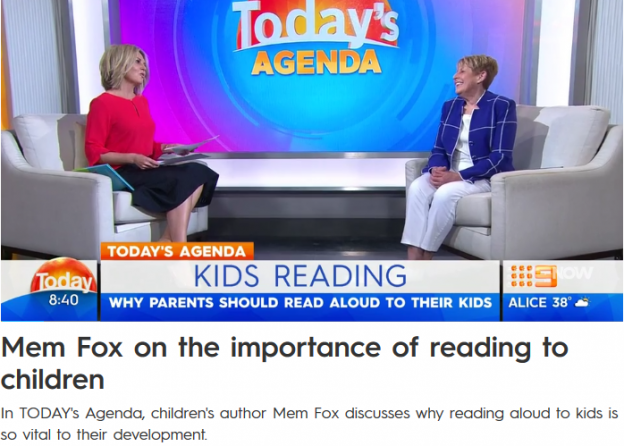
On telly’s Today show last week, celebrated children’s fiction author Mem Fox talked about the importance of reading to children, something with which absolutely everyone agrees.
Mem Fox’s missionary parents took her to Southern Rhodesia as an infant. They were, she explains, “very keen on Australian books being read to us, and our reading Australian books”. TV hadn’t been invented, so she developed a love of reading. She thanks three years at drama school in London for her understanding of language and thus ability to write books. I suspect this training may also have contributed to her storytime drama skills.
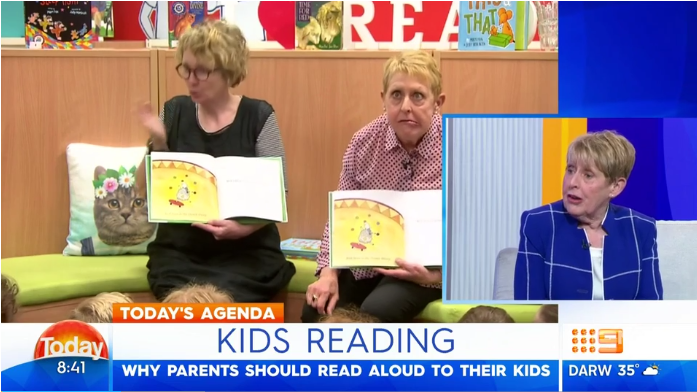
All good. Then, about three minutes into the interview, I thought I heard Ms Fox say that young children are increasingly unable to communicate effectively using spoken language.
I did a double-take. I’m a paediatric speech pathologist. You’d think I’d know about this, if it were true. I don’t recall any mention of a general decline in young children’s ability to communicate at this year’s Speech Pathology Australia conference, or in any of the journals I’ve read lately.
I rewound the video, and Ms Fox’s exact words were:
“You know if children don’t have language, if they can’t talk by the time they get to school, and I know that will sound extraordinary, people will say ‘what, they can’t talk when they get to school?!’, if children can’t talk by the age of four, or can’t make themselves clearly understood by the age of four, and that is, increasingly, you know, happening, they can’t learn to read. If you can’t, you know if you don’t have language, obviously you can’t learn to read language. So reading aloud is very, very important for education.”
If anyone reading this knows of robust, scientific research showing a general decline in preschoolers’ oral language skills, I’d be very interested to hear of it. Until then, we can only assume that this is not actually factual.
Read three books a day to children to eliminate illiteracy?!
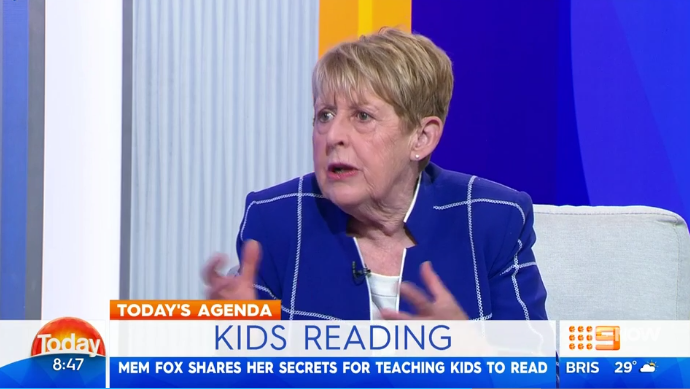
At 7.24 on the video clock, the interviewer says, “So, you believe that if every parent, or carer of course, read aloud a minimum of three stories a day to children in their care, we could eliminate illiteracy within one generation”.
Ms Fox replies, “I do believe that”, apparently blissfully unaware of how insulting this is to teachers. By this logic, their literacy-teaching work is irrelevant, because literacy is caught not taught. The many parents who faithfully read aloud to their children every day from infancy, but whose children did not learn to read at the expected time, might also find this insulting.
The science about this is entirely settled: Ms Fox is simply wrong. US public radio journalist Emily Hanford has recently produced some brilliant work explaining why, and what needs to be done about it. Please share her work with every teacher you know, it’s also relevant to Australia:
- Hard Words: Why aren’t kids being taught to read? (article and 52 minute audio documentary)
- What to do if your child’s school isn’t teaching reading right (article)
- Why are we still teaching reading the wrong way? (New York Times article)
- Why learning to read is still so hard (48 minute podcast)
“The Literacy Wars”, whatever they are
In her Today Show interview, Mem Fox goes on discuss what she calls “the Literacy Wars”. She says, “Some people want to teach reading in this way, which I find incredibly boring and putting off. Some people want to teach reading in this way, which can sometimes be too fuzzy and too warm, and you know, without, you know, strict enough teaching. There is a middle way. Nothing that we talk about after kids start school can be agreed upon, you know, people fight like mad about how to teach reading.”
Ms Fox doesn’t come out and say it’s phonics that she finds incredibly boring, but her meaning is unmistakable to anyone familiar with what the rest of the world calls “the Reading Wars”, and she explicitly bags out systematic, explicit phonics (and elevates the Cmabrigde Reading Hoax to the status of fact, see PS below for why it’s not) here, here and in her book Reading Magic.
Ms Fox says nobody disagrees about the importance of reading to kids, which is true. She fails to say that reading researchers actually can and do agree that the early teaching approach she calls boring – systematic, explicit phonics – produces the most skilled readers. Unfortunately, most universities still fail to teach teachers about this approach.
Six rhymes by age four = top reader by age eight?!
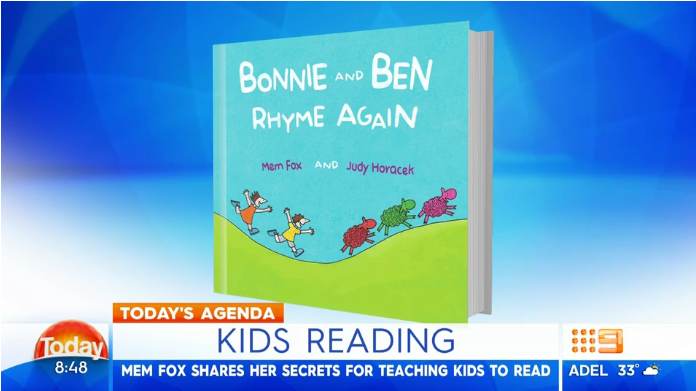
At 9:58 on the video clock, discussing (or, dare I say, marketing) her latest rhyming works of fiction, Ms Fox says, “the reason why rhymes are important is that if children know six nursery rhymes by the time they’re four, by heart, they’re usually in the top reading group by the time they’re eight. Because that’s how important learning to rhyme and predict is to learning to read. And people think ‘oh, it’s just nursery rhymes, who cares?’, but actually, you really do.”
Again, I scratched my head. I’ve read a lot of books and journal articles about how children learn to read, but have not previously been aware of a 6-rhymes-by-4, top-reader-by-8 statistic. Google Scholar isn’t shedding any light on it for me, either.
Yes, rhyming is part of phonological awareness, or awareness that words have structure as well as meaning. Good phonological awareness is important in learning to read, but once you start school it’s awareness of individual sounds in words – phonemic awareness – that matters most. Again, if anyone knows of research supporting Ms Fox’s six-nursery-rhymes statistic, I’m all ears, but until then I’ll just assume it’s made-up.
Not everyone lives in Ms Fox’s world
Not everyone lives in a nice middle-class world where every parent knows English nursery rhymes, can read and has access to lots of books. I worked for years with kids from public housing, mainly indigenous, refugee and migrant kids. Many parents have signed my permission forms with a cross, and I’m aware of Australia’s adult literacy statistics. So I know that many parents can’t actually read to their kids, because they can’t read. Ms Fox seems not to know this.
Ms Fox’s idea of a terrific “top reading group” necessarily implies a miserable “bottom reading group”, yet she doesn’t acknowledge that many, many kids from all walks of life simply cannot crack our spelling code without lots of explicit and direct phonics teaching, including access to carefully-sequenced decodable books (recently derided by education academics in The Conversation, but their arguments were quickly torn apart by Pam Snow and Greg Ashman).
In a fair system which respected children and teachers, this kind of teaching would start on the first day of school, because it is (in the words of researchers Catherine Snow and Connie Juell) “helpful for all children, harmful for none, and crucial for some”. In the hands of skilled teachers, it’s also not remotely boring.
I love Mem Fox’s children’s fiction like everyone else. Some of her facts, not so much.
P.S. In case anyone out there still thinks the Cambridge Reading Hoax is true, here’s internationally acclaimed reading researcher Professor Mark Seidenberg’s explanation of why everything it says is false, from his excellent book Language at the Speed of Sight:
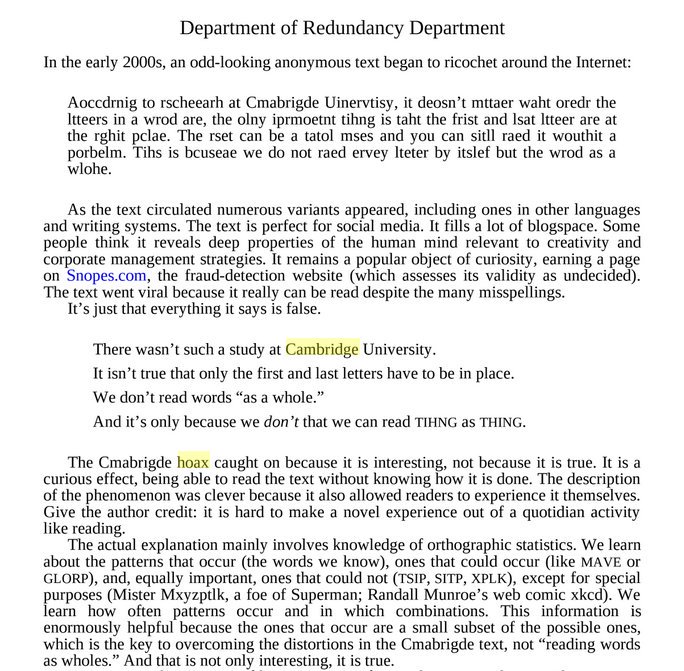
PS2 Thanks to Laura McCormack and little Augie for being home watching the Today show when Mem Fox came on, and bringing this to my attention.



I have an admiration and appreciation for Mem Fox’s books. Two of my children and I got to hear her read aloud from some of her books and it was an experience to remember (we live in the United States). I read her book Reading Magic when my oldest was still a pre-schooler and for some time, I wondered what I had done wrong as a parent that he did not take off in reading until late 2nd grade. I still see her book Reading Magic recommended every now and again and my heart aches for the parents who will read it and think that surrounding children with literature at home is all you need to do for children to learn to read.
I will say none of my children have struggled with acquiring vocabulary and have pretty broad background knowledge due to their exposure to books at home. But simply reading aloud did not teach any of my children to read. My younger children benefited from the hard lessons I learned with my oldest.
Wow! Clueless! I’m surprised too that missionaries didn’t use a phonics program, that’s very strange! Here the homeschoolers are all using some kind of direct, systematic, explicit instruction. This makes no sense!
I am becoming increasingly disappointed in Mem Fox, i’ve always liked her books but not her stance on phonics. It may have been mentioned before, but does she actually have any qualifications or training in literacy intervention?
As a SP, i’m also interested to hear if there is any evidence about a general decline in children’s language skills. I’ve heard this theory before, usually with technology being the cause of this ‘decline’, but never seen any evidence to back it up.
Love the blog 🙂
Hi Lauren, Thanks for the nice feedback. Mem Fox was a teacher educator for many years, and she is still very influential at the Australian Literacy Educators Association/Australian Association for Teachers of English, she gave their keynote at their conference this year, see http://www.aate.org.au/conferenceupdates/keynote-presenter-mem-fox. I think if there was a general decline in children’s language skills, SPAA would know and be concerned about it, and tell us! Alison
I watched Mem Fox speaking to a very large audience of teachers in the city when we used to have Early Years conferences. We were all entranced by the way she was reading one of her books to us……..until a baby in the audience (don’t know why it was there, but it was) dared to make a baby sound. Mem stopped reading and in a very annoyed voice she insisted that the baby be removed. From that moment on, I lost all respect for her.
Mem presented at a conference at Bond University on the Gold Coast in 2006 called bring back the magic. In that presentation it was clear she did not understand the process of children learning to read. She detailed in her speech how she had read a book to a child, then asked him to read it after him. According to Mem the child spoke slowly upon which she told the child I didn’t read it like that.
When Mem mimicked the child’s reading it was obvious he was trying to apply one to one correspondence to the words. She of course wanted him to memorise the text and read it whole word.
I remember feeling very let down that one of Australia’s biggest advocates for literacy really didn’t understand how children develop the skills to read. Obviously not much has changed in 12 years.
The consolation to all of this is that her books are brilliant and parents find them easy to read giving a young child exposure to vocabulary and a serve and return interaction. Let’s take the good from it.
Yes, I think all of us should stick to talking about things on which we are knowledgeable, I would never pretend to know how to tell people how to write children’s fiction.
Twin boys – one excellent reader, top of his class in Kindi and still going at 8. Other still struggling after reading with him every night, OT and speech help. Everyone is different and it’s not all about nurture – although I am doing my damnedest to nurture and we will get there!
I am a Speech Pathologist with a dyslexic son. Sorry Mem, but I read to him at least three books a day when he was young, including all of your books! He still loves to be read to at 10, reading books himself is just hard work. Without a systemic structured phonics approach he would be completely illiterate- there is so much more to reading than being read to. Thanks Alison for all your amazing work 🙂
Well, The Intrepid Alison Clarke of Spelfabet – you’ve written another outstanding and important post. I’ve added it to two forums at the International Foundation for Effective Reading Instruction, see here: https://iferi.org/iferi_forum/viewtopic.php?f=2&t=1070&p=2291#p2291
As a children’s writer, Mem Fox is not an academic authority on reading, but for some reason people accept whatever she says. I wish she would stop telling parents and teachers of Literacy (I teach MiniLit to struggling readers) that children learn to read by osmosis.
Check today’s Age Newspaper November 25 page 13 – Thank you Professor Castles for calling Mem Fox to account for her divisive comments!